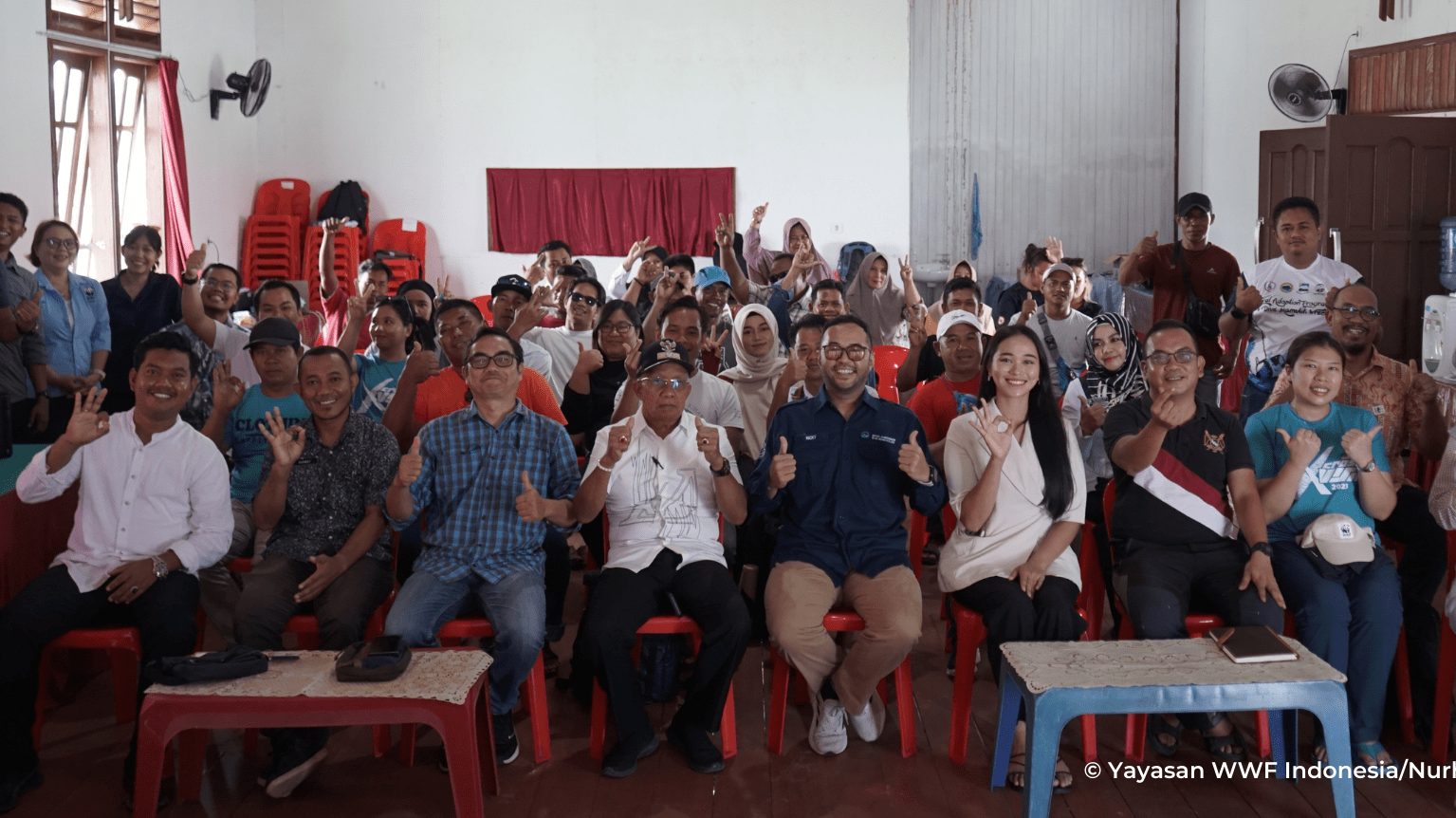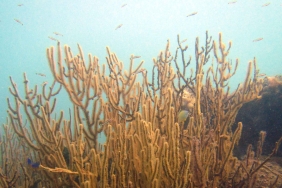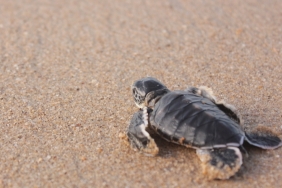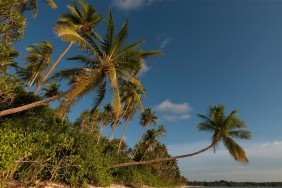DERAWAN ISLANDS CONSERVATION AREA AND TUN MUSTAPHA PARK: FIRST EXCHANGE VISIT FOR ECOSYSTEM IMPROVEMENT AND COLLABORATIVE LEARNING IN THE SULU-SULAWESI SEASCAPE
The Sulu-Sulawesi Seascape, which includes Malaysia, Indonesia and the Philippines, is home to some of the most diverse and productive marine biodiversity in the world. However, rapid population increase, unsustainable development and increasing risks of climate change have put coastal ecosystems and the livelihoods that support them under enormous pressure.
Against this backdrop, the EU-supported Ocean Governance project is implementing ecosystem improvement initiatives in the region. These include coral reef restoration in Tun Mustapha Park (TMP), Sabah, Malaysia, Derawan Islands Conservation Area, Indonesia, and mangrove restoration in Balabac Island, Philippines. These areas play an important role for marine biodiversity and coastal communities that depend on the sea for their livelihoods. Therefore, restoration methods are tailored to the circumstances of each area.
To continuously improve the management of conservation areas in the region, the project has conducted a number of dialogs and created opportunities for networking. One of these was a conservation area exchange visit between Derawan Islands Conservation Area, Indonesia, and Tun Mustapha Park, Sabah, Malaysia, which took place on August 14-18, 2023. The visit consisted of a learning exchange, a coral reef monitoring workshop, and also a field visit aimed at exchanging ideas and knowledge on coral reef rehabilitation with rock piles in the Derawan Islands Conservation Area. Each session involved relevant stakeholders, including marine protected area managers, NGOs, local communities, private sector, as well as community representatives from Derawan Islands and Tun Mustapha Park.
Learning Exchange and Coral Reef Rehabilitation Workshop
This learning exchange is designed to foster dialogue on coral reef restoration and rehabilitation methods, protected area management, community engagement, sustainable fisheries and tourism practices, monitoring, and effective marine protection policies. The dialogue platform was organized through a learning exchange aimed at building and strengthening networks between marine protected areas. On the second day of the visit, a coral restoration monitoring workshop was held to find out the progress of coral reef restoration in Tun Mustapha Park and Derawan Islands Conservation Area.
The workshop was attended by Pontianak Coastal Marine Resources Management Center (BPSPL), East Kalimantan Provincial Marine and Fisheries Office, Berau Regency Fisheries Office, Berau Regency Culture and Tourism Office, Derawan Island Village Government, Marine and Fisheries Resources Supervisor (PSDKP), PKK mothers, and representatives of community groups involved in coral reef rehabilitation projects in the Derawan Islands Conservation Area.
Progress of Coral Reef Rehabilitation in the Derawan Islands Conservation Area
Joni Ramadani, a representative of community groups in the Derawan Islands said, "Based on coral reef health monitoring in the Derawan Islands Conservation Area in 2021, in general, the percentage of living hard coral cover is 32.80%. This figure shows that the health condition of these coral reefs is in the medium category, which is 35 - 40.9%".
"But the damage to the coral reefs is thought to be due to bombing, and anchoring of tourist and fishing boats found in several places. Therefore, to repair this coral reef ecosystem, a rehabilitation method that is suitable for Derawan Island is needed," he added.
In the Derawan Islands Conservation Area, WWF Indonesia Foundation in collaboration with policy makers and the community, used the rockpile method to rehabilitate coral reefs in several selected areas, namely Gusung Senggalau Utara, Gusung Senggalau Timur, and Karang Tebba Binga. Based on monitoring results, the rock pile structure can provide a natural substrate for coral planulae to attach to in the three rehabilitation sites. The average density of hard corals attached to rock piles was 2.4 colonies per square meter in May 2023, or 10 months after rock pile construction. The monitoring also showed an increase in coral recruitment and formation of new coral colonies, as well as fish abundance and fish biomass.
Progress on Coral Reef Restoration in Tun Mustapha Park
In Malaysia, coral restoration projects continue to grow. In line with the coral rehabilitation method carried out on Derawan Island, the MARRS Reef Star (RS) method was applied in Tun Mustapha Park. Currently, there are 980 units of RS frames with 14,700 coral fragments have been installed in three different locations with different site characteristics and water conditions, covering an area of about 800 square meters of the park.
Four hundred units of RS frames were installed at Maliangin Kechil (Site A) and a further 300 units at Pitas Floating Coral Bar (Site B), in collaboration with a local tour operator called Archangel Borneo Holidays Sdn Bhd. A further 280 RS units were installed from June 27 to 29, 2023 at Site C, also located in Maliangin Kechil. Twenty units of RS were also handed over to the team in Semporna to test the MARRS Reef Star, and to date the restoration with RS is still ongoing until the results of the restoration come to fruition. In many ways, the process of preparing and installing the RS involved local communities, which catalyzed the empowerment of the surrounding communities, creating a ripple effect.
Many local people were involved in the MARRS coral restoration process, from fabrication, coating, to RS installation, including Sabah Parks, WWF Malaysia, local communities around Tun Mustapha Park who participated voluntarily, and several academic representatives and students from Universiti Malaysia Sabah (UMS).
All restoration sites are regularly monitored by community divers from Banggi Coral Conservation Society (BCCS) and Kudat Turtle Conservation Society (KTCS), a research team from Sabah Parks, and WWF Malaysia. Representatives from UMS were also frequently involved in consultations and provided input to the restoration efforts. Restoration work in Tun Mustapha Park will also potentially increase in number and extent, as Sabah Parks will also soon launch a Coral Adoption Program through a website designed for conservationists and coral lovers.
Building Collaboration and Making Inspiring Change
Topics such as marine protected area management, fisheries, tourism and community empowerment in conservation areas were also extensively discussed by representatives from each discipline attending the exchange visit between conservation area managers. Through this exchange activity, the Derawan and Tun Mustapha teams were able to build a lasting network.
The Malaysian participants were particularly impressed with the cleanliness and efficient management of the Derawan Islands Conservation Area. In addition, the hospitality and warmth provided by the islanders was also very appealing. Most notably, the participants had the valuable opportunity to discuss with the Derawan Island Village Head and gain unique knowledge. This encounter was a strong source of motivation for all participants throughout the rest of the event. The Malaysian participants, in particular, expressed strong enthusiasm to apply some of the practices learned in the Derawan Islands Conservation Area to their efforts in Taman Tun Mustapha.





